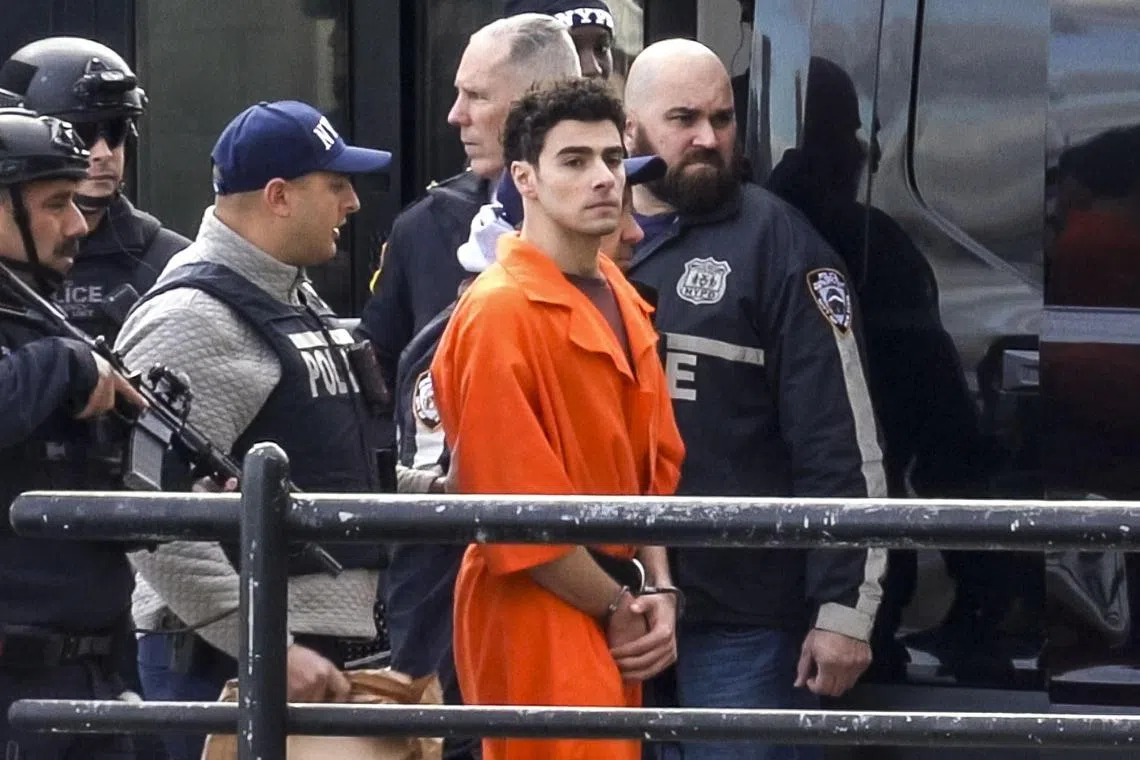‘Who’s next?’: Misinformation, online threats after US healthcare CEO slaying
Sign up now: Get ST's newsletters delivered to your inbox

Luigi Mangione, who is accused of killing healthcare executive Brian Thompson, has been widely lionised online.
PHOTO: EPA-EFE
WASHINGTON – A murder of a US healthcare boss has sparked a torrent of online misinformation and calls for violence against other executives, suggesting a failure of social media moderation that analysts fear could translate into real-world harms.
The posts, allowed to spread unfettered across tech platforms, came in the wake of the shooting of UnitedHealthcare chief executive Brian Thompson
“As much disagreement as there is about what content, if any, should be moderated, at the top of most peoples’ list would be ‘explicit threats of violence’,” said Dr Jonathan Nagler, co-director of New York University’s Centre for Social Media and Politics.
“So, seeing posts on social media that explicitly encourage violence against anyone, including CEOs of health insurance firms, suggests that content moderation has failed.”
Further exemplifying that failure, disinformation security company Cyabra identified hundreds of accounts across the Elon Musk-owned social media platform X and Meta-owned Facebook that spread a host of conspiracy theories related to the murder.
They included the unfounded claim that Mr Thompson’s wife was involved in the killing, as the couple was experiencing relationship issues.
Other posts baselessly claimed that former House Speaker Nancy Pelosi was behind the murder.
Many of these narratives were amplified by prominent influencers on X such as conservative commenter Matt Wallace, with some of them garnering hundreds of millions of views, Cyabra said.
‘Unchecked hate’
In another falsehood identified by misinformation watchdog NewsGuard, a video swirling online purportedly showed Mr Thompson admitting that he had worked with Mrs Pelosi.
But it was an old video from 2012, and the man was another Brian Thompson, who was forced to clarify on X that he was not the UnitedHealthcare CEO.
In a validation of the old axiom that a lie can travel halfway around the world while the truth is putting on its shoes, his X post drew only around 150 views while the posts advancing the false claim garnered hundreds of thousands views.
Mr Thompson’s murder has unleashed pent-up anger towards the nation’s health insurance companies, which patients and advocacy groups say fail to provide affordable care.
Many comments taking aim at the medical system quickly spiralled into targeted threats against high-profile CEOs.
Hashtags such as “CEO Assassin” gained traction, and multiple posts aimed at health insurance providers brazenly asked: “Who’s next after Brian Thompson?”
One post targeting insurer Blue Cross Blue Shield said: “Let your CEO know... you’re next!!!”
Similar posts took aim at Humana’s CEO Jim Rechtin and Mr Andrew Witty from UnitedHealth Group, the parent company of Mr Thompson’s firm.
“The danger here is clear: Unchecked hate and disinformation online have the potential to spill over into real-world violence,” said Cyabra CEO Dan Brahmy.

UnitedHealthcare CEO Brian Thompson was shot just before 7am at a hotel in the Midtown district of Manhattan.
PHOTO: REUTERS
‘Alarming power’
The companies did not respond when asked how they were dealing with the threats ricocheting online.
With the elevated risk, US corporations are increasing security personnel at offices and residences of senior executives, many of whom have been asked to delete their digital footprints, US media reported.
Ivy League graduate Luigi Mangione, who is accused of Mr Thompson’s murder, has been widely lionised

Demonstrators outside a court as Luigi Mangione, accused of killing Mr Brian Thompson, appears during an arraignment hearing on Dec 19.
PHOTO: AFP
Mr Brahmy said this demonstrated the “alarming power of unmoderated social media” to amplify violent narratives.
Social media content moderation has emerged as a political lightning rod in the United States, with many conservatives calling it “censorship” under the guise of fighting misinformation.
Platforms such as X have gutted trust and safety teams and scaled back moderation, making it what researchers call a hotbed for misinformation and hate.
“As platforms grapple with moderation challenges, it’s imperative for companies, governments and users alike to remain vigilant against the disproportionate influence of bad actors, who exploit social tensions to manipulate public perceptions and conversations,” Mr Brahmy said. AFP


